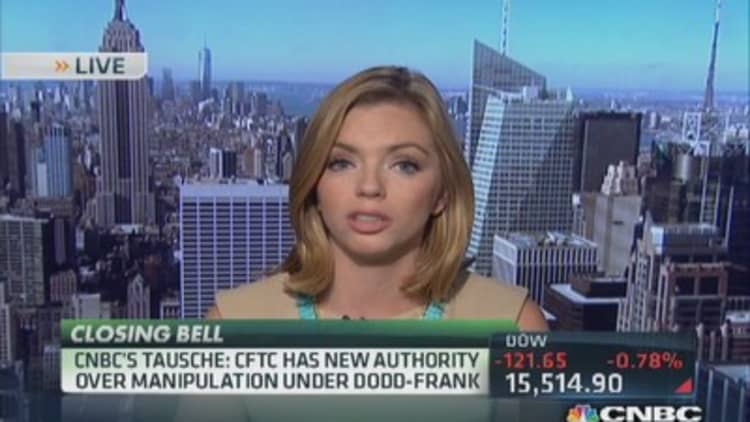JPMorgan spent nearly a billion dollars settling charges related to the so-called London Whale debacle, but that doesn't mean it's out of the woods yet.
A threatened lawsuit from the Commodities Futures Trading Commission could portend a drawn-out legal battle—or another expensive settlement.
On Monday, the CFTC notified JPMorgan that its staff had recommended filing charges against the bank over "certain trading activities" that occurred in its London office.

(Read more: Teflon Jamie: Anyone care about JPMorgan's woes?)
People familiar with the matter say the CFTC staff believes JPMorgan's trader may have manipulated the price of certain credit derivatives as part of the losing Whale trades in early 2012. JPMorgan promptly disclosed the notification—called a Wells notice—in a regulatory filing.
The bank, which has the option of either settling the case now or responding to the Wells notice within two weeks, is preparing its defense, according to someone familiar with the matter. That response must be filed by Sept. 30.
In July 2011, the CFTC gained authority against manipulation in certain markets like derivatives, swaps, commodities and futures under Dodd-Frank.
The final rule makes it unlawful to manipulate markets "intentionally or recklessly," and it's expected the CFTC's case would charge that JPMorgan's activities in relatively opaque credit markets were reckless, according to people familiar with the matter.
(Read more: As inquiries persist, JPMorgan loses favor)
Proving recklessness, these people say, is easier than proving a firm manipulated a market with intent.
The trade, which reportedly swelled to a notional value of more than $100 billion in the first few months of 2012, was so large in a relatively illiquid corner of the corporate-credit market that it caused prices to be dislocated. The sheer size and heft of the firm in the market is what earned its lead trader, Bruno Iksil, the nickname of the "London Whale."
The credit prices eventually moved against JPMorgan, leading to losses of more than $6.2 billion once the position was unwound. Between those costs and the regulatory fines, the bank's total losses have now swelled to at least $7 billion.
(Read more: )
At an industry conference, hedge fund manager Boaz Weinstein—who profited from taking the other side of JPMorgan's trade—said it was easy to spot because of the technical mispricing.
A spokesman for JPMorgan declined to comment, as did a spokesman for the CFTC. A CFTC vote at the commissioner level is not expected to take place until after JPMorgan's response is received.
—Follow Kayla Tausche on Twitter @kaylatausche and Kate Kelly @KateKellyCNBC.






